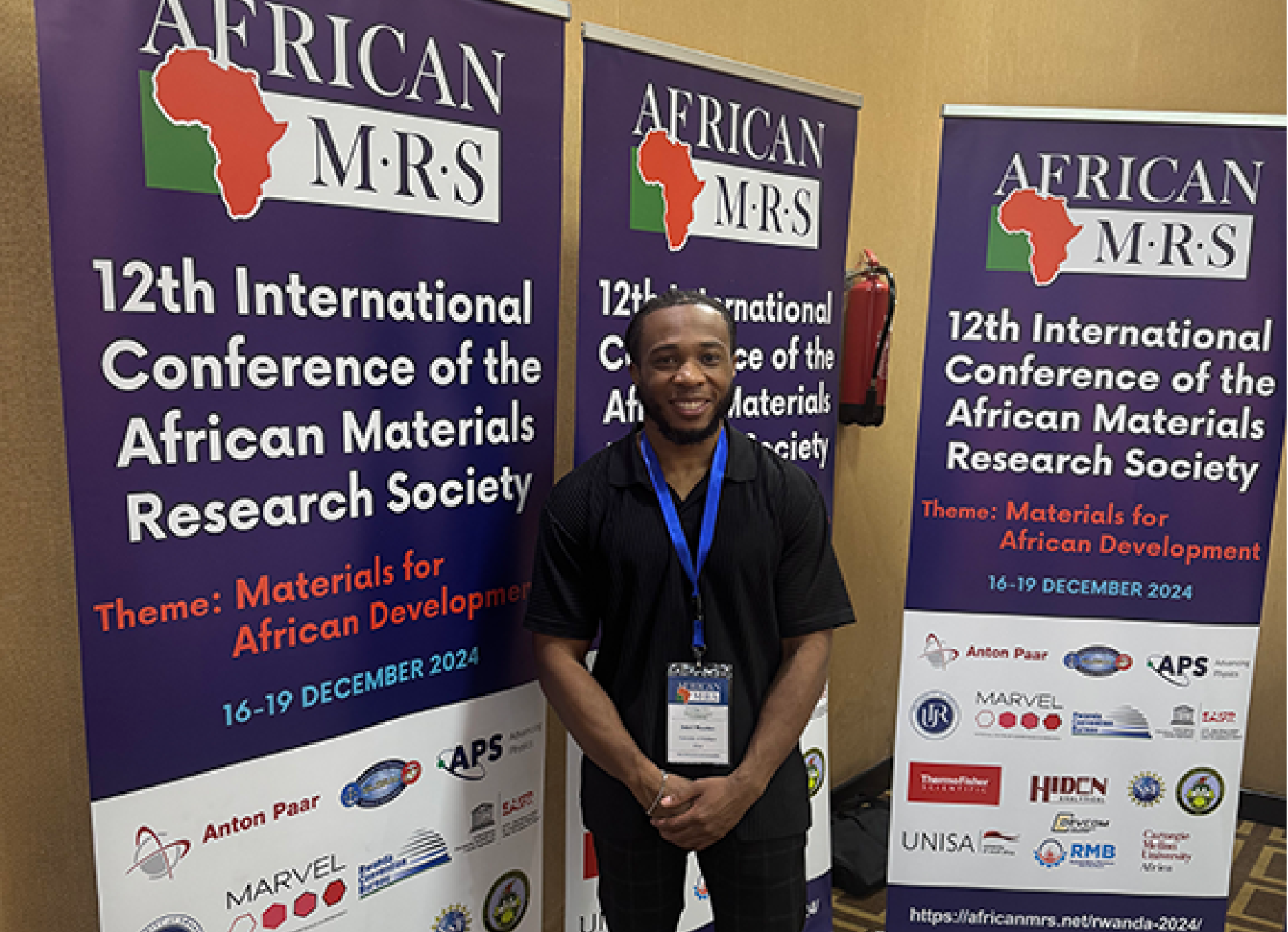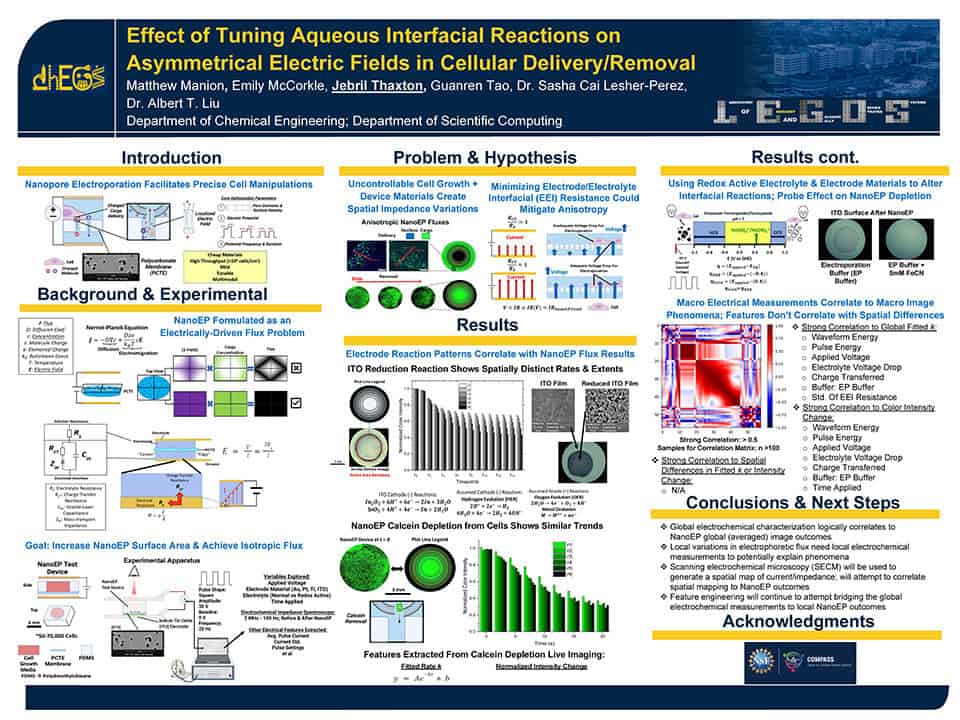
COMPASS VetIF Fellow attends AMRS Conference in Kigali, Rwanda
COMPASS Veteran Innovation Fellow Jebril Thaxton attended the 12th International Conference of the African Materials Research Society (AMRS) in Kigali, Rwanda.

COMPASS Veteran Innovation Fellow Jebril Thaxton attended the 12th International Conference of the African Materials Research Society (AMRS) in Kigali, Rwanda.
The Center for Complex Particle Systems (COMPASS) Veteran Innovation Fellowship Program (VetIF), launched in 2024, is a first-of-its-kind program that provides total support and training to undergraduate veteran students in STEM disciplines. COMPASS established the program to address the unique challenges faced by former enlisted veterans in academic and research environments.
Last December COMPASS VetIF Fellow Jebril Thaxton attended the 12th International Conference of the African Materials Research Society (AMRS) in Kigali, Rwanda. After 28 hours of travel, a 3 a.m. arrival and lost baggage, he had finally arrived.
Thaxton grew up in the Metro Detroit Area and served four years in the U.S. Navy as a nuclear plant operator onboard the U.S.S. Theodore Roosevelt. As an undergraduate student majoring in Electrical Engineering, he explores nanoscale materials in the Laboratory of Emergent and Galvanically Orchestrated Systems (LEGOS) under the guidance of Chemical Engineering Assistant Professor Albert Liu and North Carolina State University Professor Martin Thuo.
The trip was a unique, hands-on-learning experience that built on Thaxton’s previous experiences as a student and veteran. He was able to experience the goals of the AMRS first hand, “It was helpful to get a different perspective and insight into other approaches to science, because a lot of schools or a lot of institutions in Africa have limited resources,” Thaxton said, “being there, you saw a lot of creativity in how they got results or data.”
International conferences and experiential learning opportunities are an integral part of what makes the COMPASS VetIF program so successful. Thaxton’s status as a VetIF Fellow served as a launching pad for this experience. Connections to his mentors, dedication to science and his positive attitude make him the perfect person to represent VetIF, “He is truly a poster child of the success of that program,” said Nicholas Kotov, COMPASS Director and the Florence V. Cejka Professor of Chemical Engineering, “my interactions with him are indicative of a person who is enthusiastic, intelligent and focused. This is why I call him a superstar.”
“Jebril joined my research group in 2023. He has a strong foundation as a U.S. Navy veteran, where he developed a meticulous attention to detail and technical proficiency, qualities that seamlessly translated into his work in our lab.”
Albert Liu
Assistant Professor of Chemical Engineering
In addition to expanding his perspective, Jebril was able to present his poster, “Effect of Tuning Aqueous Interfacial Reactions on Asymmetrical Electric Fields in Cellular Delivery/Removal.” His research, conducted with Chemical Engineering PhD student Matthew Manion, helps to characterize devices used for nanopore electroporation (NanoEP), a novel technique developed by LEGOS for intracellular bio-macromolecule (DNA, RNA, protein) delivery. The work is instrumental in creating more scalable and accessible development pipelines of cell therapies like CAR T-cell therapy, which fights cancers like leukemia and lymphoma.

At their heart, AMRS conferences allow the scientific and research communities to build knowledge, foster relationships and promote action for further understanding and collaborations in fields associated with materials science and technology. Conference themes like infrastructure, sanitation and mineral processing serve as a launching pad for conversations that reflect both the global research community and needs specific to Africa.
As a frequent participant of Materials Research Society (MRS) conferences, Kotov holds the 2024 AMRS conference in high regard, “It was extremely impressive and quite memorable for me” he said.
In March, Thaxton received the Optica Foundation Amplify Scholarship for his research accomplishments as a VetIF Fellow with COMPASS. The scholarship is awarded annually to ten Black undergraduate or master’s students to support their financial burden in college. In addition to a $10,000 prize, students receive a one-year membership to Optica, access to additional mentorship and an invitation to the Amplify Optics Immersion Program. The Optica Foundation aims to, “recognize and foster excellence in students and early-career professionals who will be the change-makers in optics and photonics.”
After graduation, Thaxton will stay at U-M to pursue a PhD in electrical engineering and intends to contribute to the future of optical and photonic materials research.
“This fellowship is putting me in the best position to succeed in graduate school and beyond, by helping me gain a deeper understanding of my research interests, strengths, and areas for improvement,” Thaxton said.
To ask questions or get involved in VetlF, please contact Dr. Jeff Raymond at [email protected].